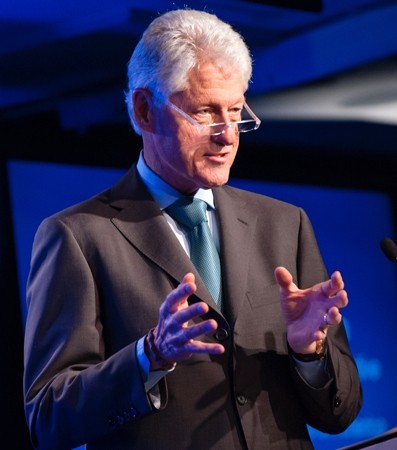Former President Bill Clinton will be among the participants Monday in a forum focused on high-impact solutions to the nation's opioid epidemic.

Image caption: Former President Bill Clinton
The event, at the Johns Hopkins Bloomberg School of Public Health in East Baltimore, will be co-hosted by the Clinton Foundation's Health Matters Initiative and the Bloomberg School. Registration for the event is full, but a live web broadcast will be available beginning at 10 a.m. Monday.
The U.S. is in the midst of a deepening opioid crisis. More than 33,000 people—an average of 91 people per day—died from opioid overdoses in 2015, according to the Centers for Disease Control and Prevention, four times the number who died from overdoses in 1999.
The epidemic is being driven by a combination of the overuse of prescription opioids such as OxyContin and Vicodin for acute and chronic pain and an increasing supply of heroin and illicit fentanyl.
In the fall issue of Hopkins Bloomberg Public Health magazine, Clinton says the epidemic can be traced to three failures: a failure to address early pitfalls, including overprescription; a failure to incorporate alternative therapies for chronic pain; and a failure to crack down on illegal pills.
"This is the time to strengthen our efforts and our commitment," he says, "and we need to make sure that in the years ahead when we do see progress, that we don't let up on our efforts."
This marks Clinton's second visit to the Bloomberg School to discuss the opioid crisis. In May 2014, he gave the keynote address at a town hall event focused on prescription drug abuse.
At Monday's event, speakers, panelists, and thought leaders will consider critical components needed to reduce the injury and death rates nationwide. Evidence-based recommendations that reflect the most current science—including recent research conducted by Bloomberg School faculty—will be the focus, and translating that evidence to action will be the goal.
Speakers and panelists
- Ellen J. MacKenzie, dean of the Johns Hopkins Bloomberg School of Public Health
- Bill Clinton, founder and chairman of the board for the Clinton Foundation and the 42nd president of the United States
- Michael Botticelli, executive director of the Grayken Center for Addiction at Boston Medical Center; Distinguished Policy Scholar in the Bloomberg School's Department of Health Policy and Management; and former director of National Drug Control Policy
- Elijah Cummings, U.S. congressman, Maryland's 7th District
- Tom Geddes, CEO of Plank Industries
- Jim Hood, CEO of Facing Addiction
- Tom Synan, chief of police in Newtown, Ohio
- Randi Weingarten, president of the American Federation of Teachers
- Leana Wen, Baltimore City health commissioner
- Erica Poellot, director of development at the Harm Reduction Coalition
- G. Caleb Alexander, co-director of the Johns Hopkins Center for Drug Safety and Effectiveness
- Andrea Gielen, director of the Johns Hopkins Center for Injury Research and Policy
- Carol Forster, physician director, Pharmacy & Therapeutics/Medication Safety, at the Mid-Atlantic Permanente Medical Group
Posted in Health, Politics+Society
Tagged prescription drugs, opioids, drug abuse











